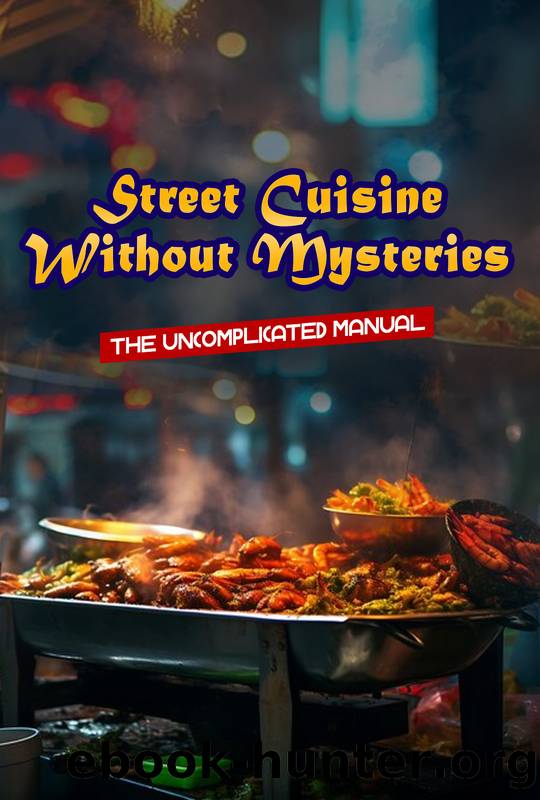Street Cuisine Without Mysteries: The Uncomplicated Manual by R. Raphael

Author:R., Raphael
Language: eng
Format: epub
Published: 2024-02-19T00:00:00+00:00
Chapter 10: Food Safety in Street Cuisine
In this chapter, we will address the importance of food safety in street cooking. With the increasing popularity of street food around the world, it is essential to ensure that food is prepared, stored and served safely to protect the health and well-being of consumers. Let's explore some of the essential food safety measures that street vendors should follow.
1. Personal Hygiene: Street vendors must maintain high standards of personal hygiene, including frequent handwashing with soap and water before and after handling food, wearing disposable gloves when handling ready-to-eat foods, and avoiding handling money and food around Same time.
2. Cleaning and Disinfection: Street food stalls should be regularly cleaned and disinfected to prevent cross-contamination and the growth of harmful bacteria. Food preparation surfaces, cooking utensils and equipment should be cleaned frequently using safe and approved cleaning products.
3. Proper Storage: Perishable foods must be stored at safe temperatures to prevent the proliferation of bacteria. Street vendors must have adequate refrigeration systems to keep food cold below 4°C and heating systems to keep food hot above 60°C.
4. Safe Food Handling: Street vendors must follow safe food handling practices to avoid contamination. This includes using clean, sanitized utensils, avoiding contact between raw and ready-to-eat foods, and ensuring food is served immediately after cooking to minimize the risk of contamination.
5. Drinking Water: Drinking water is essential to ensure the safety of street foods. Vendors must use clean water to prepare food, wash utensils and wash their hands. Contaminated water can be a source of foodborne illnesses, so it is important to ensure the water is safe to consume.
6. Compliance with Local Regulations: Street vendors must comply with local food safety regulations established by public health authorities. This may include obtaining licenses and certifications, undergoing regular food safety inspections, and following specific hygiene and food handling standards.
By following these food safety measures, street vendors can ensure that food is prepared and served in a safe and hygienic manner, protecting the health and well-being of consumers. Food safety is critical to the success and reputation of street cuisine around the world.
Download
This site does not store any files on its server. We only index and link to content provided by other sites. Please contact the content providers to delete copyright contents if any and email us, we'll remove relevant links or contents immediately.
Whiskies (Collins Gem) by dominic roskrow(42616)
World's Best Whiskies by Dominic Roskrow(42451)
101 Whiskies to Try Before You Die by Ian Buxton(42448)
Whiskies Galore by Ian Buxton(40875)
The Fast Metabolism Diet Cookbook by Haylie Pomroy(20531)
Chic & Unique Celebration Cakes by Zoe Clark(19403)
Craft Beer for the Homebrewer by Michael Agnew(17489)
The Bone Broth Miracle: How an Ancient Remedy Can Improve Health, Fight Aging, and Boost Beauty by Ariane Resnick(16158)
Tools of Titans by Timothy Ferriss(7021)
How to Be a Bawse: A Guide to Conquering Life by Lilly Singh(6739)
Cravings: Recipes for All the Food You Want to Eat by Chrissy Teigen & Adeena Sussman(6356)
The Institute by Stephen King(6327)
A Court of Wings and Ruin by Sarah J. Maas(6173)
The Last Wish (The Witcher Book 1) by Andrzej Sapkowski(4707)
Wiseguy by Nicholas Pileggi(4648)
The Fat Loss Plan by Joe Wicks(4269)
Spare by Prince Harry The Duke of Sussex(4259)
Hunger by Roxane Gay(4258)
Room 212 by Kate Stewart(4152)
